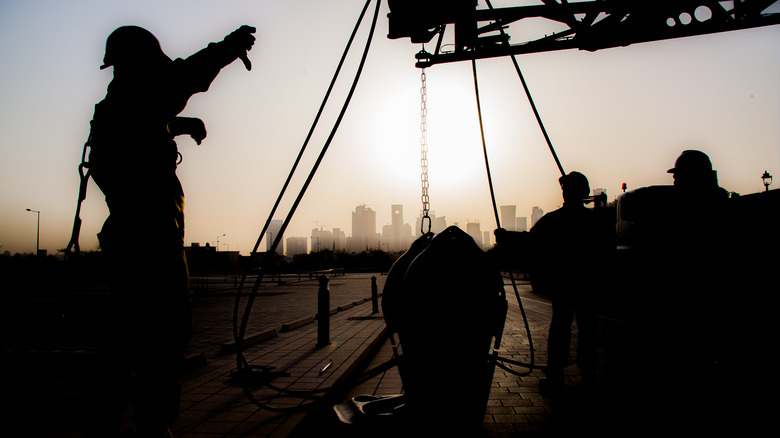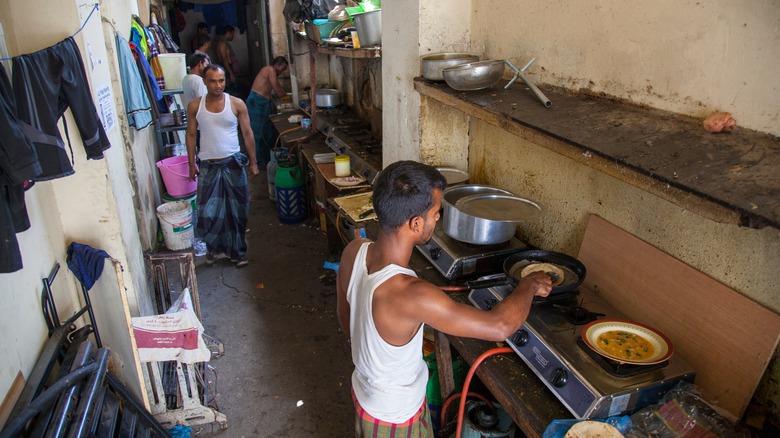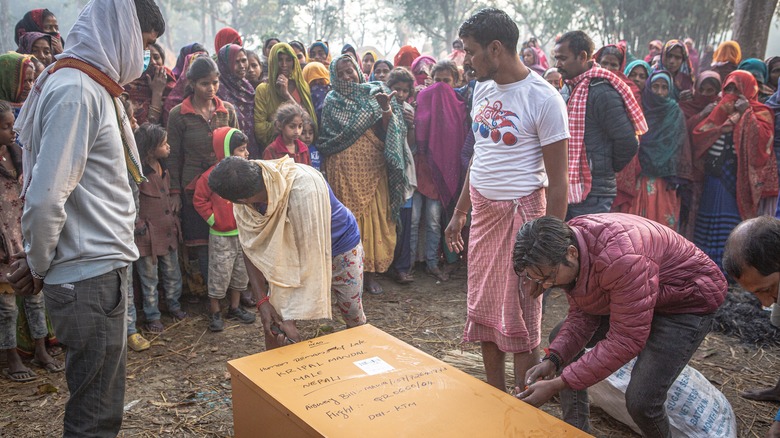Qatar Says Hundreds Of World Cup Workers Have Died, But Other Countries Say It's Much Worse
In 2009, when Qatar formally launched its campaign to be named as host country for the World Cup in 2022, the small Persian Gulf country pitched it as a chance for a cultural meeting over the world's largest sporting event. "The first global sports event in the Middle East provides an opportunity for greater understanding and unity between the Arab and Western worlds and can inspire enthusiastic support from football fans young and old across the entire region," said Sheikh Mohammed bin Hamad bin Khalifa Al-Thani, president of the Qatar 2022 bid and member of the ruling family, per Reuters. He added: "Qatar is a land of action and not just promises."
FIFA, the governing body of football, seemed to be compelled by the argument. Just 18 months later, it named Russia as the host for 2018 and, to the shock of many, Qatar for 2022. Most close observers expected the United States to be named the location for 2022 because of the resources it had in place, its success in 1994, and its overall plan. But FIFA had other ideas. "We go to new lands," said FIFA president Sepp Blatter, per The New York Times. "Never has the World Cup been in Russia and Eastern Europe, and the Middle East and Arabic world has been waiting for a long time. So I'm a happy president when we talk about the development of football."
Serious doubts about Qatar
Hosting the World Cup is a significant challenge for any country, and especially for nations that have never hosted the event before. Qatar would become the smallest country to host the World Cup, per The Washington Post, setting up a unique set of challenges that no other host country had faced before. They needed to build seven new stadiums, a new airport, miles and miles of new roads, an entire public transportation system, hotels, and a new city. How would Qatar deal with an expected 1 million visitors in a country that has less than 3 million in its total population all in the geographic space approximately the size of Connecticut? Where would they stay? How would they get around? And who would provide all the labor to make the plans happen?
Countries that have hosted previous World Cups and similar events like the Olympics have managed (and learned to deal with) logistical nightmares for the relatively short periods of the sporting events for the sake of prestige and — let's face it — massive amounts of cash. But the answer to the question about labor is much more gruesome in the case of Qatar. Like many countries building massive projects on a tight schedule, Qatar turned to migrant labor. In Qatar, about 2 million people — a whopping 95% of the workforce — are migrant workers, per Human Rights Watch, making them the vast majority of the labor population in Qatar.
Guest workers started having problems almost immediately
Many times, the problems for migrant workers begin before they even leave their home country. The workers often have to pay a fee to the firm that recruits them, which can keep them indebted for years before they can break even, per The Guardian. Then, once they arrived in Qatar, many workers say they were presented with contracts that were worth far less money than what they were promised by their recruiters. But they have little to no recourse: They're in a foreign country with no money to return home. On top of that, according to the BBC, their passports are frequently — and illegally — confiscated by their new employers.
However, the most common worker grievances are delayed payment (and sometimes no payment at all), overcrowded and unsanitary living conditions, and grossly overextended work hours that could pile up to as much as 400 hours in a month, per the AP. All of it added up to what many human rights organizations called nothing short of modern-day slavery, per SF Gate. For years, officials in Qatar maintained there was no problem among the migrant workforce. When word got out that scores of workers were dying on the job, tournament organizers rushed to claim that only 40 people had died in the decade leading to the World Cup. They said 37 people died from non-work-related deaths, and only three were from World Cup-related incidents, per USA Today.
Qatar's death count angered many
When Qatar stuck with its number of 40 deaths among migrant workers, it enraged human rights groups, national governments who had workers there, and the many families who lost loved ones. According to The Washington Post, India, which has the largest migrant population in Qatar, took issue with the Gulf country's data. India's foreign ministry said that just their country alone had nearly 2,400 of its citizens die working in Qatar between 2014 and 2021. Pakistan's embassy in Qatar reported nearly 1,000 deaths of its country's workers between 2010 and 2020.
In February 2021, The Guardian published a shocking investigation showing that more than 6,500 migrant workers from Bangladesh, India, Nepal, Pakistan and Sri Lanka died working in Qatar since it won the 2022 World Cup bid in 2010. The Guardian said the entire death toll was significantly higher than the 6,500 because a number of countries that had guest workers were unwilling or unable to provide death tolls for their citizens. For its part, the Qatari government denied The Guardian's data, but released a statement (via Axios), saying, "The mortality rate among these communities is within the expected range for the size and demographics of the population. However, every lost life is a tragedy, and no effort is spared in trying to prevent every death in our country."
World Cup kicks off in Qatar with several bangs
On November 20, 2022, the FIFA World Cup opening ceremony featured Morgan Freeman and K-Pop sensation BTS before host country Qatar took a 2-0 loss to Ecuador. Around the world, protesters boycotted the opening ceremony over Qatar's labor practices. And even the BBC appeared to snub Qatar on the matter by not showing the opening ceremony, per the Daily Mail. In many corners of the world, Qatar's denial and silence was too much, if not an insult.
A week into the tournament, Qatar's head of the World Cup, Hassan al-Thawadi, took to television to say that hundreds of migrant workers died as a result of work they had done related to the World Cup. In an interview with Piers Morgan, which aired on November 28, 2022 (via CNN), he said that, "The estimate is around 400, between 400 and 500. I don't have the exact number, that's something that's being discussed. One death is too many, it's as simple as that." He added: "I think every year the health and safety standards are improving, at least on our sites, the World Cup sites, the ones that we're responsible for, most definitely." The vague statement was insulting to some observers. "For him now to come and say there is hundreds, it's shocking," Mustafa Qadri, the executive director of Equidem Research, who works on migrant labor issues in the Middle East, told the AP. "They have no idea what's going on."




